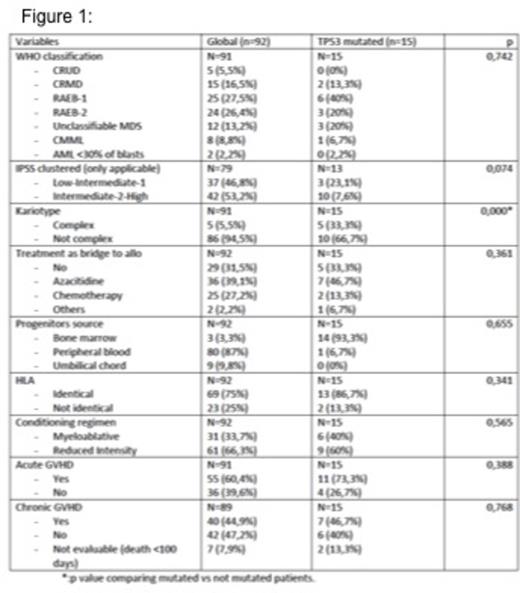Abstract
Background and Aim
Although new agents have been approved for the treatment of MDS, the only curative approach for these patients is allogeneic hematopoietic stem cell transplantation (HSCT). Nevertheless, in these patients this approach has only obtained 40-60% of overall survival. Somatic mutations in MDS have recently been analyzed in order to confirm clonally and also prognostic impact in MDS patients. In this regard, TP 53 mutated gene is present in MDS in less than 10% of patients and is associated with advanced disease and high-risk features. Recent studies confirms poor outcomes in patients with TP 53 mutated receiving allogeneic stem cell transplantation1,2. The present study try to analyze if the development of chronic graft versus host disease (cGVHD) could modify, due to graft versus leukemia effect, the adverse prognosis of these high-risk patients (TP53 mutated patients).
Design and Methods
<>Results of HSCT in 92 MDS patients from 5 centers in Spain were retrospectively studied. Samples were collected 1 month prior to transplant. 280ng of the genomic DNA from BM cells was screened for somatic mutations in TP53 gene. The study was done by NGS on a GS Junior Instrument (Roche) according to an amplicon sequencing design. For each sample, eight exons (4-11) were amplified with preconfigured primer plates provided within the IRON II study network. Data analysis, were carried out using the Sequence Pilot software version 3.5.2 (JSI Medical Systems) and GS Amplicon Variant Analyzer software, versions 2.7 and 2.9 (Roche Applied Science). Minimum coverage of sequenced exons was 100 reads and the sensitivity of variant detection was set to a lower limit of >2% for bidirectional reads. Only those variants that resulted in amino acid change in the protein sequence were considered. OS and RFS were calculated using the Kaplan-Meier method. The log-rank test was used for comparisons. All calculations were done using SPSS 18.0. Cumulative incidence of relapse was also calculated by xlstat version 2014 program.
<>Results
Median age was 54 years (17-69), 71.7% were "de novo" MDS and regarding IPSS, 53% were in the int-2/high-risk category. Other characteristics were in Table 1.
In the pre-transplant evaluation, 15 patients out of 92 (16,3%) were TP 53 mutated. The mutations were located in exons 5, 6, 7, 8 and 10. These variations were present in a variable percentageof the cell population (3 to 84%). All mutations were specific nucleotide changes except for two cases.
At the time of the last update, 16 patients had relapsed (17.4%) and 40 had died (43.5%). After a median follow up of 15.5 months, OS was 56.5%. Median OS for patients with mutated TP53 trend a toward to be shorter than survival for patients without mutated TP53 (median of 7 mo vs median not reached, respectively, p=0.156). Multivariate analysis for OS confirmed complex karyotype (HR 5,588, 95CI 1,794-17,407, p=0.003) and no developement of cGVHD (HR 3,531, 95IC 1,634-7,632, p=0.001) as predictors for poor outcome.
Cumulative incidence of relapse was 20.3% (+/-4.3%) at 1 years. Mutational status of TP53 significantly influenced on relapse (53.3% +/-12.9% vs 13.7% +/-4% at 1 year for patients with vs without TP 53 mutation (Gray test=0.001, Figure 2).
Regarding Relapse Free Survival (RFS), after a median of follow up of 17 months, RFS was 67.9% and as previously suggested, the presence of TP 53 mutation had an impact on RFS (41.7% for mutated (median RFS of 6 months) and 75% for non mutated patients (median RFS not reached), p=0.009). Multivariate analysis for RFS confirmed age (HR 1.054, 95CI 1.005-1.106, p=0.032) and TP 53 mutated (HR 3.054, 95IC 1.145-8.149, p=0.026) as predictors for lower RFS.
Regarding 15 patients with mutated TP 53, 7 did relapsed and 9 had died. Developement of cGVHD showed a trend toward to improve outcome among TP 53 mutated patients, with a better OS and RFS for those developing cGVHD as compared to those who did not (OS of 55% vs 17% for patients with and without cGVHD, p=0.039, Figure 2 and RFS of 71% vs 50%, respectively, p=0.3).
<>Conclusions
Mutated TP53 pre-allo patients presents poor outcome as compared to not mutated, as previously described Bejar1 and Kim2. Nevertheless, the developement of cGVHD could overcome the adverse impact of this factor due to the developement of graft versus tumor efect, improving survival curves (OS and RFS) as compared to previous published results. Study supported by GRS-1033/A/14 P53.
1.-BŽjar, JCO 2014, 32(25).
2.-Kim, BBMT 2015, Epub ahead of print.
Sanz:JANSSEN CILAG: Honoraria, Research Funding, Speakers Bureau. Valcarcel:AMGEN: Honoraria, Membership on an entity's Board of Directors or advisory committees, Speakers Bureau; NOVARTIS: Honoraria, Membership on an entity's Board of Directors or advisory committees; GSK: Membership on an entity's Board of Directors or advisory committees, Speakers Bureau; CELGENE: Honoraria, Membership on an entity's Board of Directors or advisory committees, Speakers Bureau. Díez-Campelo:CELGENE: Research Funding, Speakers Bureau; JANSSEN: Research Funding; NOVARTIS: Research Funding, Speakers Bureau.
Author notes
Asterisk with author names denotes non-ASH members.




